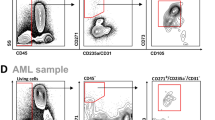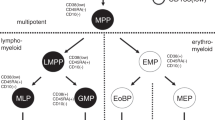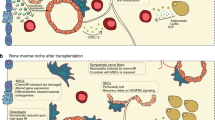Abstract
Since reduced marrow cellularity and prolonged pancytopenia following autologous bone marrow transplantation (ABMT) have been frequently observed in patients with acute myelogenous leukemia (AML) included in the AML10 GIMEMA/EORTC trial, the question was raised to what extent hematopoietic and microenvironmental progenitor cells were involved in these patients. Marrow hematopoietic progenitors were investigated by a short-term methylcellulose assay quantitating multipotent CFU-Mix, erythroid BFU-E and granulocyte–macrophage CFU-GM, as well as a long-term assay quantitating long-term culture- initiating cells (LTC-IC). The marrow microenvironment was studied by evaluating the incidence of fibroblastoid progenitors (CFU-F) and the capacity of stromal layers to support allogeneic hematopoietic progenitors. As compared to normal controls (n = 57), AML patients (n = 26) showed a statistically significant reduction of the mean (± s.e.m.) number of CFU-Mix (5.3 ± 0.6 vs 0.8 ± 0.2, P ⩽ 0.0001), BFU-E (68 ± 5 vs 20 ± 4, P ⩽ 0.0001), CFU-GM (198 ± 11 vs 144 ± 15, P ⩽ 0.008), and LTC-IC (302 ± 46 vs 50 ± 8, P ⩽ 0.001). The mean (± s.e.m.) incidence of marrow CFU-F was not significantly reduced as compared to normal controls (48 ± 6 vs 52 ± 7, P ⩽ 0.73). Seventeen AML stromal layers were tested for their capacity to support the growth of allogeneic hematopoietic progenitors. Seven samples failed to support any progenitor cell growth, seven had a significantly lower supportive activity as compared to normal stromal layers (13 ± 5 vs 249 ± 56, P ⩽ 0.002), whereas three cultures could not be analyzed due to contamination. In conclusion, induction and consolidation regimens used in AML patients of the AML10 protocol induce a markedly defective in vitro growth of primitive hematopoietic progenitors and a severe functional defect of marrow stroma. The association of hematopoietic with microenvironmental damage might play a key role in the delayed hematopoietic regeneration observed following ABMT in patients of the AML10 trial.
This is a preview of subscription content, access via your institution
Access options
Subscribe to this journal
Receive 12 print issues and online access
$259.00 per year
only $21.58 per issue
Buy this article
- Purchase on Springer Link
- Instant access to full article PDF
Prices may be subject to local taxes which are calculated during checkout
Similar content being viewed by others
Author information
Authors and Affiliations
Rights and permissions
About this article
Cite this article
Carlo-Stella, C., Tabilio, A., Regazzi, E. et al. Effect of chemotherapy for acute myelogenous leukemia on hematopoietic and fibroblast marrow progenitors. Bone Marrow Transplant 20, 465–471 (1997). https://doi.org/10.1038/sj.bmt.1700916
Received:
Accepted:
Issue Date:
DOI: https://doi.org/10.1038/sj.bmt.1700916
Keywords
This article is cited by
-
Efficacy and safety of human adipose tissue-derived mesenchymal stem cells for supporting hematopoiesis
International Journal of Hematology (2012)
-
Alkylating chemotherapeutic agents cyclophosphamide and melphalan cause functional injury to human bone marrow-derived mesenchymal stem cells
Annals of Hematology (2011)
-
Chemotherapy-induced mesenchymal stem cell damage in patients with hematological malignancy
Annals of Hematology (2010)
-
Transplantation of mesenchymal stem cells to enhance engraftment of hematopoietic stem cells
Leukemia (2007)
-
Constitution and telomere dynamics of bone marrow stromal cells in patients undergoing allogeneic bone marrow transplantation
Bone Marrow Transplantation (2003)



